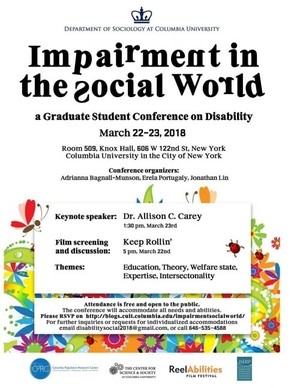Keynote Speaker: Dr. Allison C. Carey, Professor of Sociology and Director of Disability Studies, Shippensburg University
In 2013 more than one in five American adults had a disability and four percent needed assistance in daily activity. While the experience of living with a disability affects a significant portion of the population, it is relatively understudied in the social sciences. Social science research on disability is caught between a medical model which stresses physiological impairment, and a social model that emphasizes stigma and discrimination without attending to the substantiality of impairment. This opposition between the social and medical models inhibits sociological research on disability. Believing that disability is a meaningful social category worthy of inquiry, we have organized this conference to investigate the role of impairment in shaping the social world and the lives of individuals. We hope to develop a model of disability that attends to the relationship between impairment and social life; the ways in which disability shapes and is shaped by the social world.

